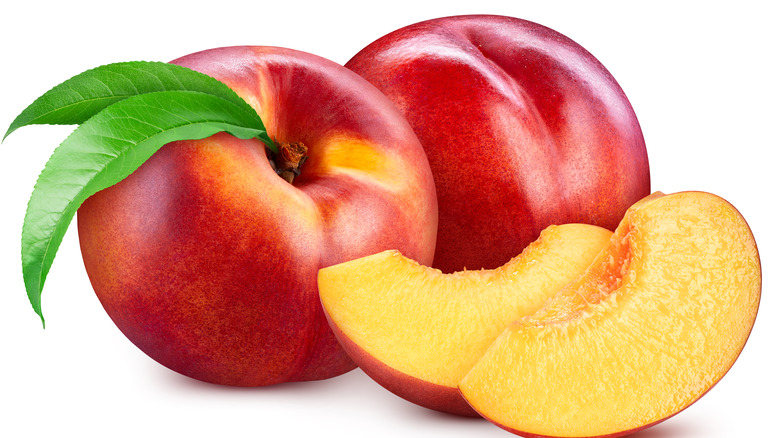This Is How Nectarines Got Their Name
Some people wait all year for stone fruit season, and every summer, farmers markets and grocery stores are brimming with peaches, plums, and cherries. Of course, there are also nectarines, that reddish fruit with a yellow interior and a hard pit, or "stone" at its core, great for cooking and baking or just eating out of hand. Even just the fruit's name can bring up summer memories of savoring the juicy snack.
Surprisingly, nectarines are technically just a variety of a peach without that pesky fuzz, reports Healthline. Still, the fruit has developed a niche all its own. The Wisconsin Department of Public Instruction says that nectarines actually developed through a natural mutation that eliminated the one gene that causes the fuzz, and that nectarines and peaches can even be found growing on the same tree. Although there are some differences between nectarines and peaches, they both likely came from China over 2,000 years ago (via Food Reference). Now, 95% of our nectarines are grown in California and can be found all over the country during the summer months. Somewhere in between, they acquired that delectable name.
Nectarine comes from the word 'nectar'
Anyone who has bitten into a juicy, golden nectarine on a hot summer day and has felt the juice drip down their hand will easily see where the name comes from. Even though nectarines are basically nude peaches, we don't call them that. Their name appears to be inspired by the flavor and juice of the fruit. According to ShortPedia, the word nectarine means "sweet as nectar," with "nectar" meaning "food of the gods" (via The Wisconsin Department of Public Instruction). Fans of the sweet food will definitely agree that it is aptly named.
In addition to being one of the best fruits in summer, this delightful snack might actually be good for you. EatFirst reports that nectarines have loads of antioxidants and vitamins A and C, which may help with blood pressure regulation, immunity, heart health, and weight loss. The BBC confirms this and adds that nectarines may also affect bone health because they contain calcium, phosphorus, and vitamin K. Who knew something named "the nectar of the gods" could be so nutritious and delicious?

